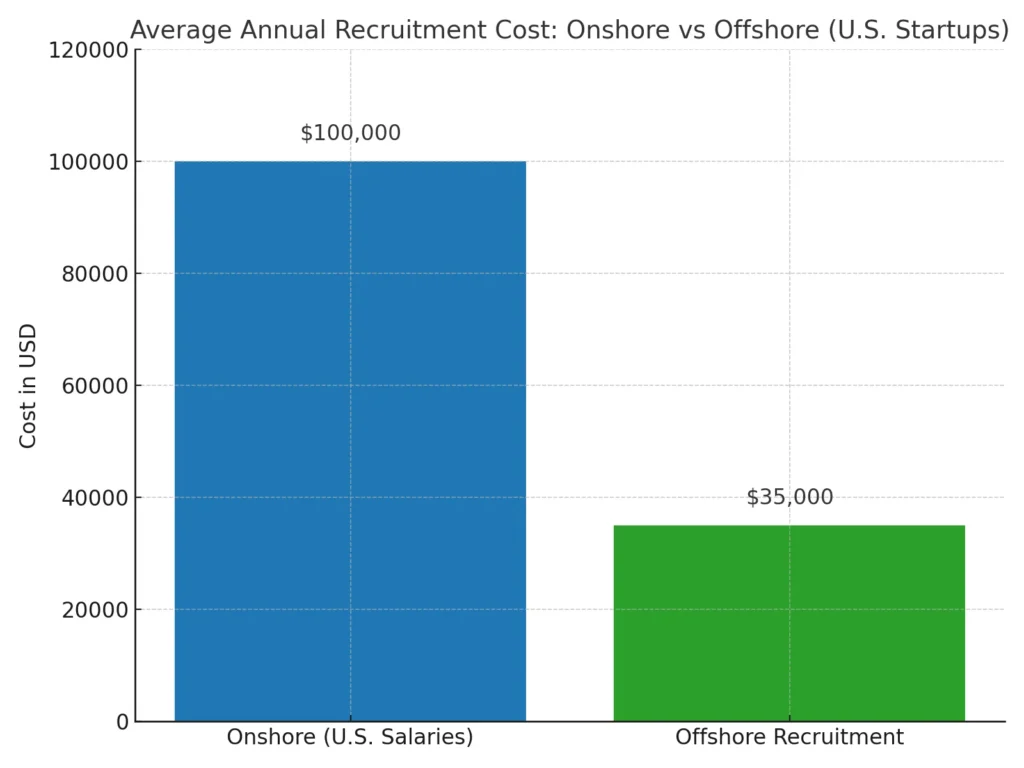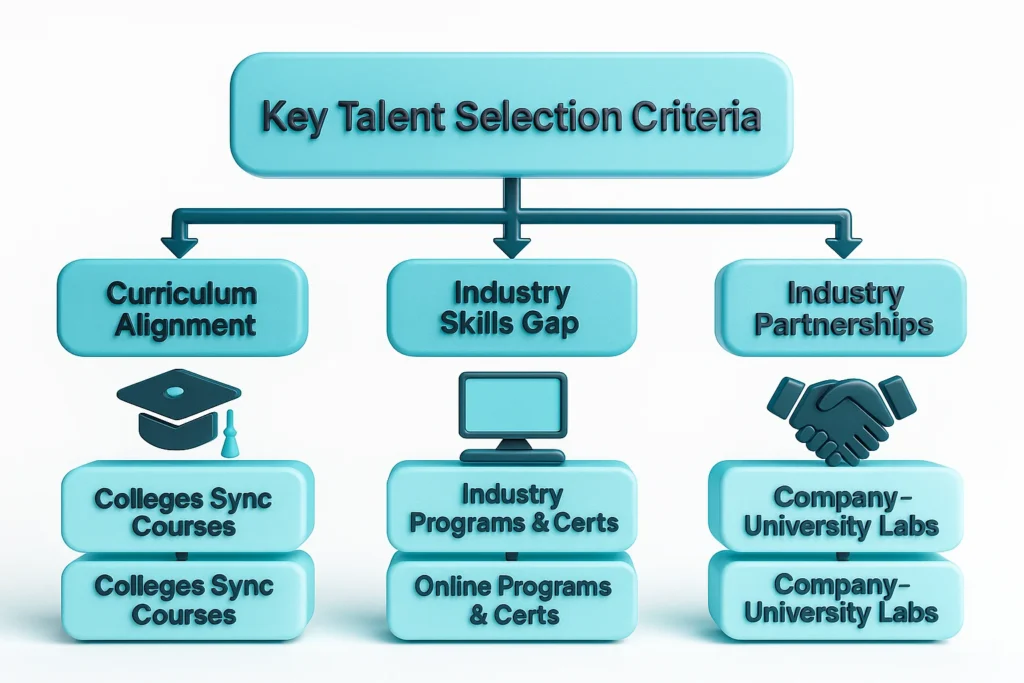The Ultimate Guide for Businesses in the Global Economy
In the era of technological advancements, the decision to hire offshore employees is no longer optional, as offshore hiring is transformative. As per the researchers and scholars, nearly 70% of the Company CEOs are intending to change their business models and are moving towards hiring remote employees because this will save them costs that they can reinvest into innovative things which will bring good fortune and stability to the business organizations (George, A. Shaji, et al., 2025).
With an estimated projection, global offshore market is of $389 billion by the end of 2033 because startups and scaling companies are increasingly looking for something more ways like looking beyond the domestic borders for accessing affordable and high quality talent. What was actually considered to be a cost-cutting strategy is now an important part of business growth and innovative advancements.

The cost of offshore recruiting for early-stage and scaling startups is reduced from 60%–70% when compared to salaries in the U.S. This financial freedom provides an opportunity for businesses to use these savings to further invest in R&D, marketing, scaling the business, etc. The phenomenon of remote works have been considered already in the 80’s, but nowadays it seems that this phenomenon is gaining a huge popularity due to the advancements in technology and the AI innovations (Kłopotek, Magdalena, 2017).
In addition to the price, offshore software development is attractive due to its supply of specialized skills which is otherwise unheard of. Sold on the opportunities Countries such as India, Eastern Europe and Southeast Asia are rich in terms to talent, brimming with developers, designers and AI specialists. With distributed teams, startups can enjoy round-the-clock development cycles which accelerate time-to-market and improve their agility.
India continues to lead the world in offshore software development services with the availability of a large talent pool and cost-effective pricing. But your mileage may vary, depending on what vendors you use, and in-house standards.
Singapore and China are both leading countries now offering high-quality high-end solutions for those businesses that believe in quality over cost on offshore custom software development.

When choosing to hire offshore employees, it is critical to evaluate communication skills, cultural fit, and technical expertise. Strong proficiency in English and the ability to cooperate and collaborate in Agile environments are very important and non-negotiable.
Deciding between different offshore recruitment sourcing models is either staff augmentation, i.e., individual placements, or fully managed teams in offshore development centers. With the time offshore teams are increasingly integrating AI tools like GitHub Copilot and other custom machine learning solutions, which are making offshore AI engineers a valuable addition to the stacks of business organizations.
Safeguarding intellectual property and sensitive data is paramount. Usually, startups are engaged in offshoring IT functions and should navigate data privacy laws, multi-jurisdiction contracts, and IP agreements.
Complying with operational standards, tax regulations, and local labor requires due diligence. Some of the best practices include thorough NDAs, Vendor vetting, ongoing audits, and also by leveraging legal experts who are experts and are familiar with International Labour and Compliance.
Agile + DevOps = The hybrid approach to distributed team managment. These environments allow for easy process across remote contexts.
For max productivity, use timezone-overlap scheduling and asynchronous collaboration. Utilize platforms such as Slack, Zoom and Jira for daily updates and project tracking. Briefings on cultural sensitivity and language training help to improve collaboration across borders.

Structured onboarding is the key for success in offshore software development. This is something like approving single source of truth, contributed code, design and other stakeholders pay this prices and everybody must attend.
To keep the best offshore talent, provide clear paths for career growth, some level of equity ownership and local benefits. Fostering team identity through company-wide rituals, virtual meetups and peer recognition programs.
Modern QA strategies include AI-based testing and continuous integration (CI) pipelines. To keep the bar high in terms of good coding standards, ensure code cleanliness, peer reviews, and prevent and measure efficiency through clear KPIs and targets for the team.
Frequent, honest feedback and clear metrics are required for transparent evaluation for success that track the quality of offshore software development services is a must.
Mitigate geopolitical or regional risk with a multi-country strategy. By having several vendors and/or locations, businesses can maintain operations even if service is interrupted.
Strengthen contracts with SLA enforcement clauses, and also establishing a contingent plan with backup resources and emergency contacts is very essential to keep tracts of the problems and they ways to mitigate them.

Recent offshore custom software development trends include the smart contracts and blockchain for secure and transparent payments. Early-stage ventures are also starting to co-design products with offshore AI labs as another phase of innovation takes shape.
The need for experienced offshore AI engineers will grow as developers increasingly collaborate with AI tools. Developing AI-capable teams today will enable start-ups to win in tomorrow’s digital economy.
Deciding to hire offshore is no longer just about cutting costs — it’s about making your business more resilient, tapping into new waves of innovation and scaling with speed. From Latin America to Southeast Asia, the worldwide talent market is filled with potential for those who dare to think outside traditional hiring models.
First, startups need to begin with a pilot project, compare vendors and establish legal grounds. In 2025 and beyond, offshore recruiting will be a key pillar of startup success, not a backup plan.
Start building smarter. Start building globally. Start by hiring offshore.
George, A. Shaji, T. Baskar, and M. M. Karthikeyan. “Future of work trends: Key insights for 2025.” Partners Universal Multidisciplinary Research Journal 2.1 (2025): 7-12.
Kłopotek, Magdalena. “The advantages and disadvantages of remote working from the perspective of young employees.” Organizacja i Zarządzanie: kwartalnik naukowy 4 (2017): 39-49.
Join thousands of businesses leveraging offshore staffing to scale their operations globally
Expand effortlessly with My Offshore Employees - access top 1% offshore talent starting at just $3/hr or $600/month per FTE. No hidden fees, no compromises on quality. Your offshore employees work exclusively for you - ensuring focus, transparency, and real-time visibility into your projects. We combine smart automation and proven industry experience to deliver higher productivity, fewer errors, and tailor-made solutions for your business growth.

© 2022-Present MyOffshoreEmployees.com – A brand of iWebGenics Pvt. Ltd. (India)